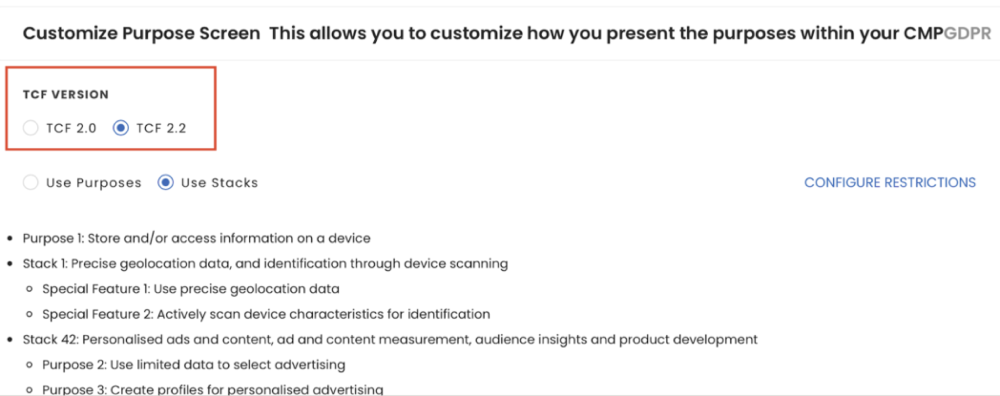The Transparency & Consent Framework (TCF), initiated by the Interactive Advertising Bureau (IAB) Europe, establishes standardized procedures for user data handling and consent acquisition in online advertising. Crucial for navigating the dynamic digital advertising landscape, TCF empowers businesses to collect and manage user consent, specifically for targeted advertising, while respecting privacy preferences. At version 2.2, TCF is a cornerstone for industry transparency and compliance. Key aspects include:
As an accountability tool, TCF aligns with the ePrivacy Directive and General Data Protection Regulation (GDPR), adapting principles from these regulations to the online industry context. It carefully considers the European Data Protection Board's (EDPB) guidance at the EU level and the Data Protection Authorities' (DPA) guidance at the national level. Upgrade to TCF 2.2 for enhanced functionality and alignment with the latest industry standards.
The Transparency & Consent Framework (TCF) is a voluntary standard designed for adoption by three distinct categories of stakeholders. Regardless of membership status in IAB Europe, all stakeholders are encouraged to utilize the TCF.
The TCF 2.2 is the latest installment in the journey towards enhanced user privacy and transparent data practices. It sets the stage for a more refined, user-centric, efficient digital advertising ecosystem. Let's discuss some of the most interesting key features of TCF 2.2:
TCF 2.2 emphasizes transparency by offering users a clearer understanding of how their data is processed. Publishers and advertisers must provide detailed information about data usage, enabling users to make informed decisions regarding consent.
Users now have more granular control over their consent preferences. TCF 2.2 allows publishers and vendors to request specific permissions for different processing purposes, providing users with a more nuanced consent experience.
TCF 2.2 caters to the global nature of digital advertising. It accommodates the diverse privacy regulations worldwide, ensuring compliance with regional requirements such as GDPR and CCPA.
CMPs are encouraged to use the CMP Validator Chrome Extension to facilitate compliance verification. This extension encompasses all the requirements of TCF 2.2, offering a comprehensive toolset for ensuring adherence to the specified policies and specifications.
TCF 2.2 brings forth substantial changes, building upon the foundation of TCF 2.0. From improved consent management to new features and enhanced functionalities, discover the transformative elements that differentiate TCF 2.2.
Publishers and CMPs must ensure easy access for users to resurface CMP UIs and withdraw consent effortlessly.
These critical updates and adjust your implementations accordingly. For more details, see IAB Europe Transparency & Consent Framework Policies. Additionally, you can see Understanding the Transparency & Consent Framework v2.2 to explore more.
Explore the cutting-edge features and improvements introduced in TCF 2.2 that elevate user transparency, compliance, and the overall experience for publishers. Discover what makes TCF 2.2 a significant leap forward from streamlined consent signals to refined data processing.
By empowering users with more control over their data and privacy preferences, TCF 2.2 fosters trust and engagement. Advertisers and publishers respecting user choices will likely build stronger, more positive relationships.
TCF 2.2 simplifies the challenge of navigating diverse global privacy regulations. Implementing TCF 2.2 ensures that digital advertising practices align with the specific requirements of various regions, reducing legal and compliance risks.
The framework's focus on granular consent allows for more efficient and targeted consent management. Publishers and vendors can tailor their requests to specific data processing activities, reducing ambiguity and enhancing user understanding.
To enact the policy changes, IAB Tech Lab has revised the technical specifications for the Transparency & Consent Framework. The updates encompass the following:
Implement these changes accordingly for seamless integration with the updated framework.
To upgrade from TCF 2.0 to TCF 2.2, follow the instructions below:

For more information on callback function in TCF 2.2, see the following topics:
For more information and access to dedicated TCF resources, see Transparency & Consent Framework.
By installing this SDK update, you agree that your Children Privacy Compliance setting remains accurate or that you will update that setting, whenever there is a change in your app's audience. You may update the app's Children Privacy Compliance settings at https://publisher.inmobi.com/my-inventory/app-and-placements.